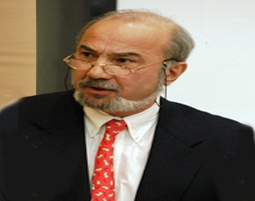BRICS does not want to be under U.S. thumb: American professor
‘Countries want to join BRICS to escape from Western economic and financial hegemony’

TEHRAN – An American professor says BRICS does not to be “under the thumb of the U.S.” and believes that de-dollarization is a “crucial goal” that the BRICS countries are seeking.
Hossein Askari, the Iran professor emeritus of international business and international affairs, also tells the Tehran Times that the main motivation of certain countries that are seeking to join BRICS is to “escape from U.S. and European economic and financial hegemony.”
Following is the text of the interview:
Can BRICS emerge as a strong counterweight to the Western economy?
“Yes, but it will take enlightened economic and financial policies over many years if not a few decades, unparalleled political and economic cooperation, and as always some luck. Today, the GDP of Western economies, no matter how you measure it using market exchange rates or Purchasing Power Parity (PPP) rates, dwarf those of the BRICS and greatly exceed even an enlarged BRICS as currently envisaged. To catch up, sustained and sound policies are the key. Unfortunately, this has not been the case with the current members of BRICS nor in the proposed members, such as Saudi Arabia, Indonesia and Iran. Yes, it is always good to have luck, resurgent and sustained energy prices, high prices for the mineral exports of BRICS, such as rare earth metals, and economic stagnation in Western economies. Also important for the eminence of the dollar is the deep U.S. financial markets and the political and financial stability of the U.S. And most important, cooperation among an enlarged BRICS membership to counter U.S. economic and financial sanctions by defying secondary U.S. sanctions and working together to undermine the international role of the dollar.
Simultaneously, I think that the BRICS should challenge the legality of U.S. economic sanctions in a number of international fora—IMF/IBRD, WTO, International Court of Justice.”
Why do many countries, including Iran, Argentina and Saudi Arabia, want to join the bloc?
“Countries want to escape from U.S. and European economic and financial hegemony, whereby the U.S. determines the rules of the game and anyone who opposes it is slapped with debilitating sanctions, the stealth weapon of war in the post-WWII era, while the U.S. benefits from seignorage associated with the dollar and uses it as the weapon to isolate countries from the international economic and financial system. The BRICS want to change the rules of the game and not be under the thumb of the U.S.”
“De-dollarization would topple the U.S. as captain of international finance and trade and render the system fairer to all. But this will not be easy.”
One of the main agendas of BRICS is “de-dollarization”. How do you see this move?
“It is a crucial goal. It would topple the U.S. as the captain of international finance and trade and render the system fairer to all. With hoped-for economic and financial benefits to follow. But this will not be easy. The BRICS need to become more dominant in the international economic system—higher GDP, larger role in international trade and investment, a coordinated plan to substitute the renminbi for the dollar in their exports and imports, selling their holdings of U.S. Treasuries, buying each other’s sovereign debt and even those of euro-zone countries and opposing U.S. secondary sanctions. ”
Do you agree with this view that steps toward de-dollarization are a consequence of Washington’s policy, which has been weaponizing its dollar?
“The weaponization of the dollar, supported by financial sanctions that include cutting off countries from SWIFT, is the important impetus for this. Over two decades ago, the euro was supposed to undermine the role of the dollar. It has not because of the size of EU economies, their performance and depth of their financial markets.”
In fact, what issues are mostly involved in the de-dollarization move?
“I think we have covered much of this already. Namely, the weaponization of the dollar and the international financial system and primary and secondary economic sanctions. Secondarily, is the untold benefits that the U.S. derives from the international role of the dollar. I must also add that U.S. economic policies affecting the exchange rate of the dollar have significant implications for sovereign international debtors and creditors.”
What is your opinion of the New Development Bank (NDB) established by BRICS, especially as it aims to launch an alternative to SWIFT?
“The proposed NDB has little to do with an alternative to SWIFT. NDB is a development bank. SWIFT is the main messaging network through which international payments are facilitated between institutions.”
Can the NDB challenge the IMF and World Bank?
“Not for years, if not decades to come. The BRICS must be willing to pledge hundreds of billions of dollars, or dollar equivalent financing, if not trillions.”
BRICS and some other countries like Mexico have refused to join the sanctions against Russia for its war on Ukraine. Does it suggest that the West is no longer the dominant economic and military power, or that the world is entering a new stage?
“No. The BRICS would have to refuse to adhere to all secondary U.S. sanctions on all countries. So take the case of Iran. They would have to buy Iranian oil and gas and pay Iran in a non-dollar currency to sidestep U.S. blocking payment to Iran. Invest in Iran. Protect their ships trading with Iran. And of course when they do this, the U.S. would sanction the BRICS country defying U.S. secondary sanctions. So the BRICS would threaten the dominance of the West if they can band together to oppose U.S. secondary sanctions, improve their economic performance, deepen their financial markets, enhance their economic, financial and political stability and expand their membership. But expanding BRICS will require time and debate. Some BRICS countries want to avoid NATO members and countries that are perceived as anti-Western, while others such as China and Russia are more open to including anti-Western countries.”